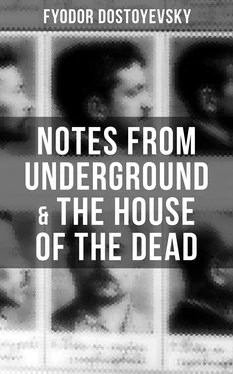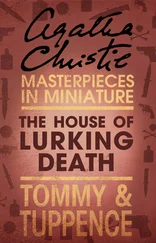The eager curiosity with which my fellow convicts examined me, their harshness towards a former nobleman now joining their society, a harshness which sometimes took the form of hatred-all this tormented me to such a degree that I was only too glad to go to work in order to measure at one stroke the whole extent of my misfortune, to begin at once to share the common life, and to fall with my companions into the abyss.
But all convicts are not alike, and I had not yet begun to distinguish from the general hostility a certain sympathy which here and there was manifested towards me.
After a time the affability and goodwill shown by several of the prisoners gave me a little courage and restored my spirits. Most friendly among them was Akim Akimitch, and I soon noticed other kind, goodnatured faces in the dark and hateful crowd. I consoled myself with the thought that bad men are to be found everywhere, but even among the worst there may be something good. Who knows? These fellows may be no worse than others who are free. Reflecting thus, I felt some doubt, but how right I proved to be!
There was Suchiloff, for example, a man whose acquaintance I did not make until long afterwards, although he was a near neighbour during almost the whole period of my confinement. Whenever I speak of the better type of convict who is no worse than other men, my thoughts turn involuntarily to him. He acted as my servant, together with another prisoner named Osip whom Akim Akimitch had recommended to me immediately after my arrival. For thirty kopecks a month this man agreed to cook me a separate dinner, since I could pay for my own food and might not be able to stomach the ordinary prison fare. Osip was one of the four cooks chosen by the prisoners to work in our two kitchens. Incidentally, they were at liberty to refuse these duties, and to give them up whenever they thought fit. The cooks were men who were not expected to do hard labour: they had to bake bread and prepare the cabbage soup. They were called ‘cook-maids,’ not from contempt (for the men chosen were always the most intelligent) but merely in fun, and they took no offence at the name.
For many years past Osip had been regularly chosen as one of the ‘cook-maids.’ He never refused the duty except when he was out of sorts, or when he saw an opportunity of smuggling vodka into the barracks. Although he had been condemned as a smuggler, he was remarkably honest and good-tempered, as I have already observed; at the same time he was a dreadful coward, and feared the rod above all things. Of a peaceful, patient disposition, affable towards everyone, he never became involved in quarrels. But he could never resist the temptation of bringing in spirits, notwithstanding his cowardice: it was simply his love of the game. Like the other cooks he dealt in spirits, but on a far smaller scale than Gazin because he was afraid of the risks involved. I always lived on good terms with Osip. To have a separate table it was not necessary to be very rich; it cost me only one rouble a month apart from the bread, which was supplied free. Sometimes when I was very hungry I determined to eat the cabbage soup, in spite of the disgust with which it invariably filled me, until after a time my revulsion entirely disappeared. I generally bought one pound of meat a day, which cost me two kopecks.
The old soldiers who watched over the internal discipline o:f the barracks were kindly souls, ready to go every day to market and make purchases for the convicts. For this they received nothing except a small gift from time to time. They did it for the sake of peace, for had they refused their life in the prison would have been a perpetual torment. They used to bring in tobacco, tea, meat-anything, in short, that was desired, always excepting spirits.
For many years Osip prepared for me every day a piece of roast meat. How he managed to cook it remained a secret. The strangest part of the arrangement was that during all this time I scarcely exchanged two words with him. I tried many times to make him talk, but he was incapable of keeping up a conversation. He would only smile and answer my questions with ‘yes’ or ‘no.’ He was of Herculean stature, but had no more intelligence than a child of seven.
Suchiloff was also one of those who helped me. I had never asked him for his assistance; he attached himself to me of his own accord, and I scarcely remember when he began to do so. His principal duty consisted in washing my linen. For this purpose there was a basin in the middle of the courtyard, round which the convicts washed their clothes in prison buckets.
Suchiloff found means of rendering me a number of small services. He boiled my samovar, ran to perform various commissions for me, got me all kinds of things, mended my clothes, and greased my boots four times a month. He did all this with the utmost zeal, with a businesslike air, as if he was conscious of the importance of what he performed. He seemed to have linked his fate to mine, and interested himself in all my affairs. He never said, for instance, ‘You have so many shirts,’ or ‘your waistcoat is torn’; but ‘We have so many shirts,”our waistcoat is torn.’ I had somehow inspired him with admiration, and I really believe I was his sole concern in life. As he knew no trade whatever, his only source of income was from me. It must be understood that I paid him very little, but he was always delighted with whatever he received. He would have been destitute had he not been my servant; he preferred me to others because of my greater affability, and, above all, my larger generosity. He was one of those fellows who never get rich, and never know how to manage their affairs; one of those who were hired by the gamblers to watch all night in the corridor, listening for the least noise that might announce the arrival of the governor, and who, in the event of a night inspection received nothing, unless it were a flogging for their lack of watchfulness. One characteristic of this type is a complete lack of personality, which seems altogether to have deserted them.
Suchiloff was a poor, meek fellow; all the courage seemed to have been beaten out of him, although he had in fact been born like that. On no account whatever would he have raised his hand against anyone in the prison. I always pitied him without knowing why, and I could not look at him without feeling the deepest compassion. If asked to explain this, I should find it impossible to do so. I could never get him to talk, and he never became animated except when, to put an end to all attempts at conversation, I gave him something to do or sent him on an errand. I soon found that he loved to be ordered about. Neither tall nor short, neither ugly nor handsome, neither stupid nor intelligent, neither old nor young, it would be difficult accurately to describe this man, except that his face was slightly pitted after smallpox, and that he had fair hair. He belonged, as far as I could make out, to the same company as Sirotkin. The prisoners sometimes laughed at him because he had ‘exchanged.’ During the march to Siberia he had ‘exchanged’ for a red shirt and a silver rouble. It was thought comic that he should have sold himself for such a small sum, to take the name of another prisoner in place of his own, and consequently to accept the other’s sentence. Strange as it may appear, it was nevertheless true. This custom, which had become traditional and was still practised at the time I was sent to Siberia, I at first refused to believe, but found afterwards that it really existed. This is how the exchange was effected:
A company of prisoners starts for Siberia. Among them there are exiles of all kinds, some condemned to hard labour, others to labour in the mines, others to simple colonization. On the way out, no matter at what stage of the journey, in the Government of Perm, for instance, a prisoner wishes to exchange. Let us say his name is Mikhailoff, that he has been condemned to hard labour for a capital offence and does not like the prospect of passing long years in captivity. He is a cunning fellow and knows just what to do. He looks among his comrades for some simple, weak-minded fellow whose punishment is less severe, who has been condemned for a few years to the mines or hard labour, or has perhaps been simply exiled. At last he finds someone like Suchiloff, a former serf, sentenced only to become a colonist. The man has travelled fifteen hundred versts (about one thousand miles) without a kopeck, for the good reason that he and his kind are always without money. Fatigued and exhausted, he can get nothing to eat beyond the fixed rations, nothing to wear apart from his convict’s uniform.
Читать дальше












